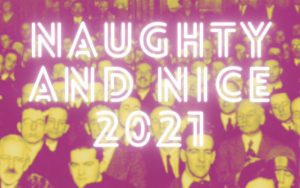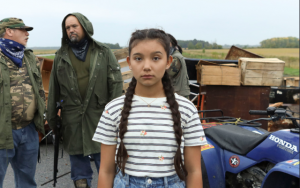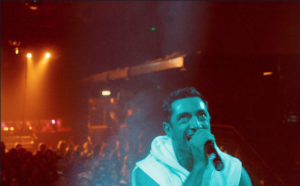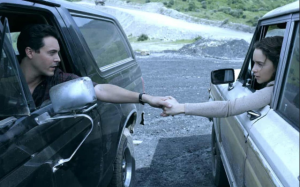LOOKING BACK AT THE MOVIES OF 2021: THE NAUGHTY AND NICE LISTS!
 Goodbye 2021. Hello 2022. Another weird year in the books.
Goodbye 2021. Hello 2022. Another weird year in the books.
I got asked two questions over and over this year. Every day someone asks me, “May I see your vaccine passport?” Every other day someone asks, “Do you think movies theatres will ever go back to normal?”
The answer is always an unabashed, “yes.” Theatres are open but audiences haven’t flooded back to fill seats, but I think they will.
Why?
It’s not just the lure of the popcorn or the Twizzlers. It’s an age-old ritual.
During the pandemic we’ve gotten used to watching movies at home or on our phones, but no matter what set-up you have in your living room, the thing missing is the ancient practice of sharing entertainment with a large group of strangers.
It’s a primal thing, hard-wired into our DNA, that dates back to when tribes of cave dwellers would sit around fires and tell stories through to the Globe Theatre, vaudeville, the talkies and right up to today’s IMAX and AUX screenings.
People have gathered to be entertained since there were tales to be told because there is no better way to enjoy the storytelling experience than surrounded by strangers who are laughing, crying, gasping— whatever — in response to a shared event.
In our double and tripled vaxxed era, no matter how large your TV or comfortable your sofa, home viewing misses the magical element of community. And these days we need as much of that as we can get. In the theatre you’re getting the sound and the picture the director intended, but more than that, the experience brings people together, inspires conversation, respect and triggers actual physical interaction with others. Try that as you stream a movie on your iPhone.
In the wake of Omicron, the variant with the name of a supervillain, and whatever comes next, we may be hesitant to flock back to theatres but, when it is safe, I believe we will. I like the way English novelist Angela Carter described watching a film in a theatre. She called it “dreaming the same dream in unison” and that, for me, will never go out of style.
So, without further ado, here, in alphabetical order, is my “Nice” list of the films that made going to the movies in 2021, a pleasurable communal experience.
 The search for identity is not a new concept in coming-of-age films but the First Nations context here, combined with Kiawentiio’s breakout performance, make Beans important, vital cinema.
The search for identity is not a new concept in coming-of-age films but the First Nations context here, combined with Kiawentiio’s breakout performance, make Beans important, vital cinema.
Every frame in Belfast radiates with the warmth of the connection Buddy shares with his family, and his family’s relationship to their home and country. But set against a time of upheaval, this is a family drama, but not a political one.
King Richard may be the most inspiration movie of the year. Maybe ever. There is uplift in almost every frame.
Licorice Pizza is kind of flipping through a diary. Some details are vivid, some glossed over, but everything is relevant to the experience being written about. Like diary entries, the movie is episodic. Each passing episode allows us to get to know Gary and Alana a bit better, and just as importantly, remind us what it means to be young and in love.
Like the people it documents, Lift Like a Girl is dynamic and scrappy, but still wears its heart on its pumped-up sleeve.
Mass is raw and real, devastating, nuanced and somber, a beautifully acted study in misery that allows for a flicker of hope
 Mogul Mowgli occasionally bites off more than it can chew, but as uncomfortable as it can get, it is never less than compelling.
Mogul Mowgli occasionally bites off more than it can chew, but as uncomfortable as it can get, it is never less than compelling.
Roadrunner: A Film About Anthony Bourdain provides an emotionally raw portrait of a gifted, charismatic man who travelled the world but never quite figured out where he needed to be.
Rockfield: The Studio on the Farm is an exercise in nostalgia, but it’s an entertaining one. A look back at rock ‘n roll’s first residential studio, it’s a guided tour through several generations of British rock’s guitar.
Despite a rather joyous finale, Spencer has more to do with a psychological horror film than a traditional biopic.
Street Gang: How We Got to Sesame Street is a loving portrait, painted with clips that are sure to trigger happy memories for those who grew up watching the show, or even watching kids as they watched the show.
Summer of Soul (…Or, When the Revolution Could Not Be Televised) brims with excitement, pain, hope and, of course, dynamic performances and great music.
Tick, Tick… Boom! is a celebration of the creative process and the following of dreams. Director Lin-Manuel Miranda brings Rent composer Jonathan Larson’s story to life with equal parts reverence and joy.
The Tragedy of Macbeth is accessible without ever playing down to the audience. Masterful filmmaking mixes and matches the text with compelling images and wonderful performances to create a new take on the Scottish Play that is both respectful and fearlessly fresh.
The storytelling is linear in The Velvet Underground documentary, but the visuals are an idiosyncratic eyeful that match the ambitious nature of the music.
West Side Story is Spielberg’s most compelling film in years. It reinvents, reimagines and re-contextualizes a classic story with energy, respect and lots of finger snapping.
It wasn’t all sunshine and lollipops, however. Here’s the “Naughty” list of movies that didn’t quite cut it for me in 2021.
 An IMDB search reveals the name Above Suspicion has been used at least twelve times, dating back to 1943. This most recent addition to the ever-growing list of Above Suspicion titled movies is about as generic as the common name would imply.
An IMDB search reveals the name Above Suspicion has been used at least twelve times, dating back to 1943. This most recent addition to the ever-growing list of Above Suspicion titled movies is about as generic as the common name would imply.
The Addams Family 2 is goofy, not ooky, with none of the eccentric charm of the 1960s TV show.
The Comeback Trail sings the praises of the power of the movies to inspire and transform lives. Film fans may enjoy the sentiment but they likely won’t be as impressed by the slack pacing and obvious telegraphing of joke after joke.
The most Wes Anderson-y film in the Wes Anderson playbook. If you forced a bot to watch 1000 hours of Anderson’s films and then asked it to write a movie on its own, The French Dispatch would be the result.
The first half of Halloween Kills offers up some fun when Myers is onscreen, lumbering his way toward another victim. Unfortunately, it’s less fun when the vigilante mob endlessly chants ‘evil dies tonight.’
The first movie was an over-the-top mish mash of exotic locations, violence, jokes and romance. The Hitman’s Wife’s Bodyguard contains all those elements, but is somehow less than the sum of its parts.
The drama in The Ice Road quickly melts away like ice before a fire, leaving behind a residue of clichés, long, drawn out action & fight scenes and dialogue borrowed from a hundred other, better action movies. A long and winding road to nowhere.
The lo-fi story of Let Us In relies on throwback practical effects, dark contact lenses and loads of alabastrine make-up, but the hair on the back of your neck will never stand up.
Nicolas Cage brings his patented oddball performance style along for the ride but even that isn’t enough to give Primal‘s bland storytelling and lazy action some zip.
The Seventh Day seeks to reinvent the exorcism movie via the buddy cop genre but succeeds only in combing the most hackneyed bits of each.
A strange mix of heartfelt drama and slapstick comedy, The Starling relies on very likeable actors to try and bring a sense of balance to the material but not even Melissa McCarthy, Kevin Kline and Chris O’Dowd can bend this mishmash of tones into a cohesive whole.
